
The European Union is becoming very serious about creating a greener future and the annual event called EU Green Week only proves this fact. The week starting with the 31st of May, until the 4th of June was dedicated to hosting the annual series of events concerning how to tackle pollution. These events included high-level political debates, awards, virtual exhibitions, preview features and side-events, as well as the hundreds of the EU Green Week Partner activities staged all over Europe.
Pollution affects each of us through the air we breathe, the water we drink and the land that sustains us. Pollution can be present in our residences, making living conditions much worse than they should be. It is the largest environmental cause of both physical and mental illness, and a major factor in the premature death of children, people with medical conditions and the elderly.
The EU Green Week 2021 brought together different groups in society together with stakeholders and policymakers to thrash out the solutions and make the ambition for a zero-pollution and toxic-free environment a reality.
Perhaps the most interesting of the events that took place during the EU Green Week was a partner event, which discussed how to tackle and combine energy poverty and air pollution into a single-issue area. This event took place on the 3rd of June, and was organized by the new Energy Poverty Advisory Hub. This is a currently ongoing EU initiative aiming to build upon existing energy related structures, transforming the Energy Poverty Observatory into it, while using the Covenant of Mayors for Climate and Energy and the Clean Energy for EU Islands project as extensions of its base.
In large parts of Europe, low-income households often suffer from a combination of poor domestic heating systems, insufficient insulation and limited financial resources to access sustainable energy services. As a result, there is a visible impact on the air quality, which has a big impact on the livelihoods and health of residents. Therefore, this partner event focused on the tight connections between air quality and energy poverty, and how household energy renovations could be the answer to the problems of vulnerable energy consumers, such as those living in the region of Central and Eastern Europe, for example.
The event was moderated by Jeppe Mikel Jensen from the Climate Alliance, which is a group dedicated to stopping further deterioration of the climate and environment. The speakers represented a wide variety of organizations across Europe, with people such as Teresa Aristegui, a Policy Officer from DG Energy, EU. She presented the EU’s views on how the Fit for 55 package will be one of the key measures in strengthening the energy performance of buildings to promote greener and healthier renovation.
Ina Karova from the Energy Agency of Plovdiv in Bulgaria, which is an agency that has been studying the link between energy poverty and air pollution for more than a decade, has contributed to the discussion, too. According to the investigation that Ina has been a part of,
energy poverty increases the use of raw materials for heating, as well as it creates a culture of low energy consumption, poor energy habits, lack of energy and environmental damage.
This is especially true for households heating with wood and coal, which they found to encapsulate the heaviest issues of energy poverty, such as poor housing conditions, cramped apartments, and the fact that the elderly and disabled live in even worse conditions than those heating with wood and oil.
Wood and coal are expensive, impractical, and ineffective materials for heating, hence a solution to tackle the alarming air quality that stems from such heating sources would be to change stoves into more efficient ones, upgrading boilers as well as a reduction in energy generation by using fossil and non-renewable fuels. This, according to their research, brought a 10% reduction in energy consumption and a 30% increase in air quality, which is a small, but significant win.
A living example of grave air pollution is also North Macedonia's capital city of Skopje. Back in 2019, Habitat for Humanity EMEA in cooperation with Habitat for Humanity Macedonia produced a short video "Winter, Leave" capturing the situation in Skopje to raise awareness and knowledge about this particular issue.
Joao Pedro Gouveia, a senior researcher from FCT-NOVA University of Lisbon, highlighted the issues of energy poverty in Portugal, but also shed a light into how such problems can be universal across Southern and Eastern Europe. According to him, it is also important to look at
different backgrounds standing behind the problems of energy poverty which definitely differ between EU regions.
Energy poverty is linked the abundance of harmful pollutants present in homes due to inefficient energy consumption. Electrification and a replacement of inefficient biomass and coal fueled equipment should, therefore, be a necessary step to address energy poverty as well as health related concerns.
Find more information about the EU Green Week and the recordings of the sessions here.
Find more information about the transition of Energy Poverty Observatory here.
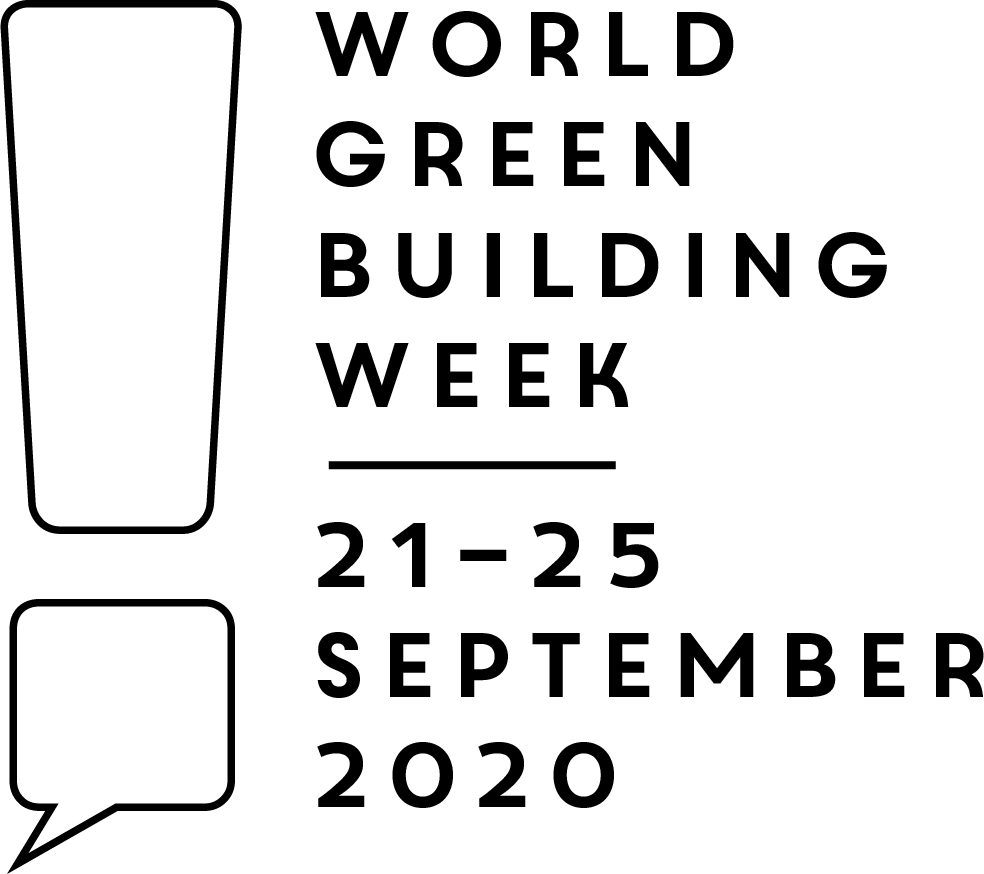
This week, from September 21st to September 25th 2020, World Green Building Council (WGBC) organizes the 11th edition of World Green Building Week which is an annual campaign empowering all relevant stakeholders to deliver greener buildings. This year, the main topic of the week are net zero buildings and the main goal is to mobilize relevant policymakers, governments and building sector to act toward delivering more and more net zero buildings. The campaign is underlined by global goal of tackling the climate change and the belief that each of us can make a difference.
The campaign is built around a key slogan #ActOnClimate and consists of three pillars arguing for support of net zero buildings:
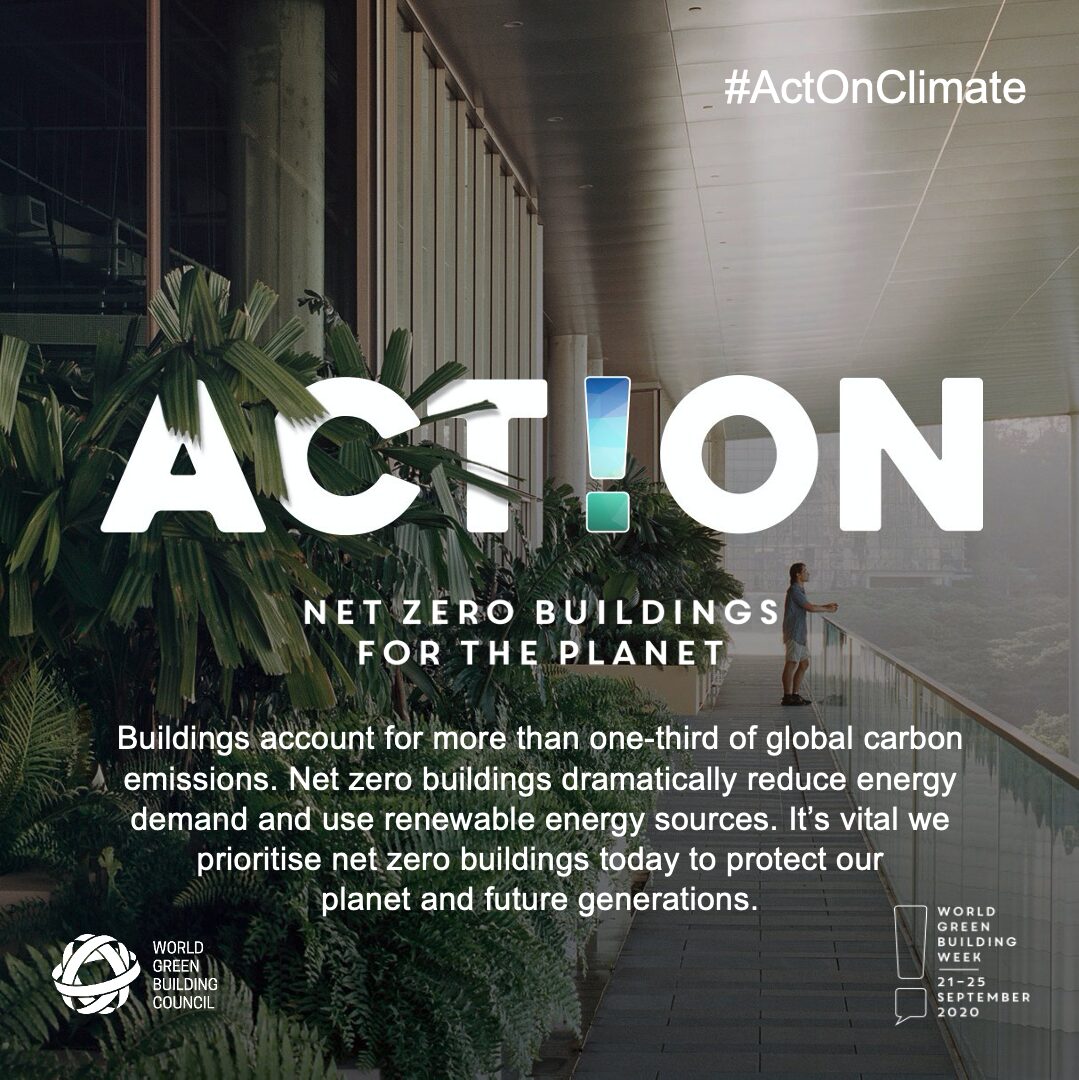
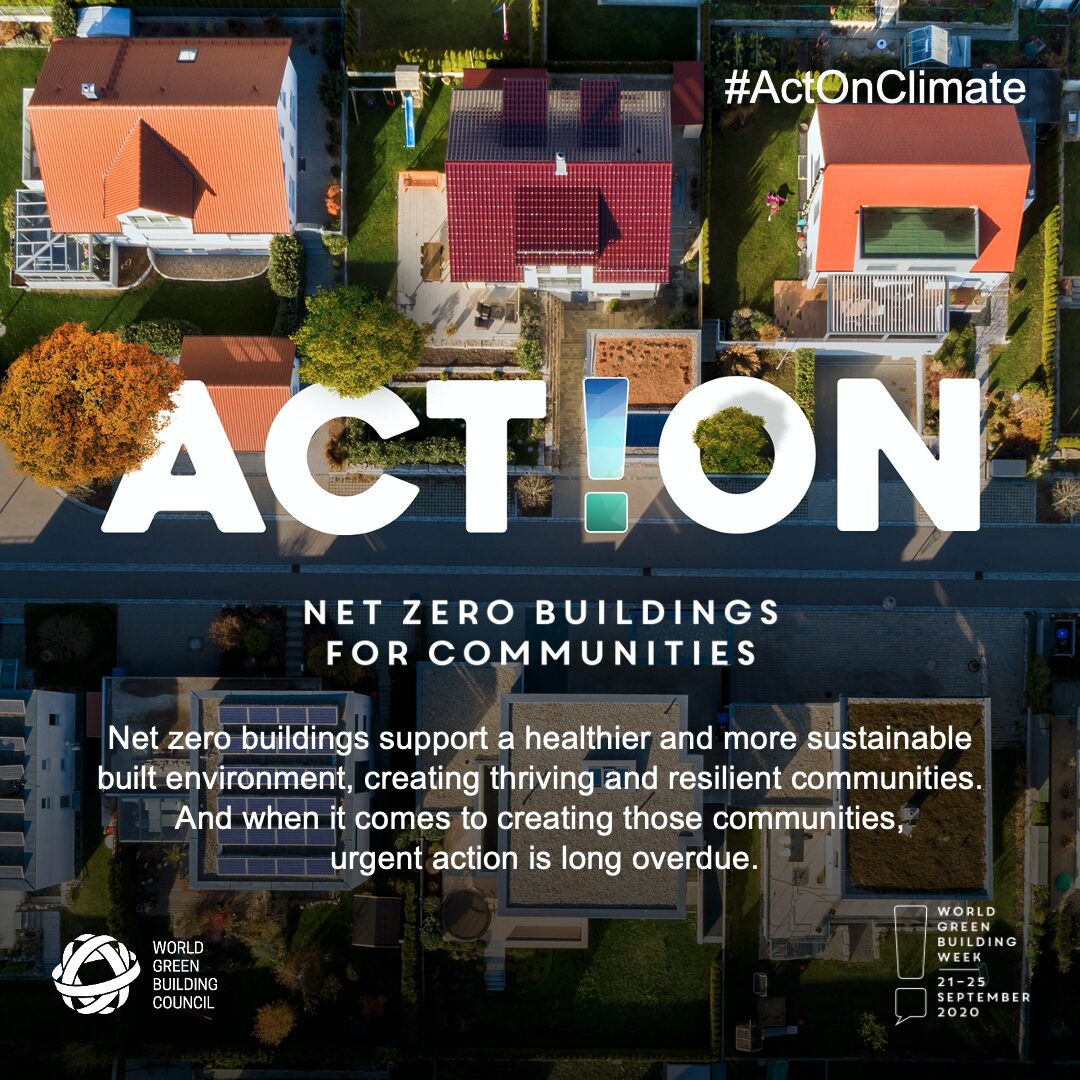
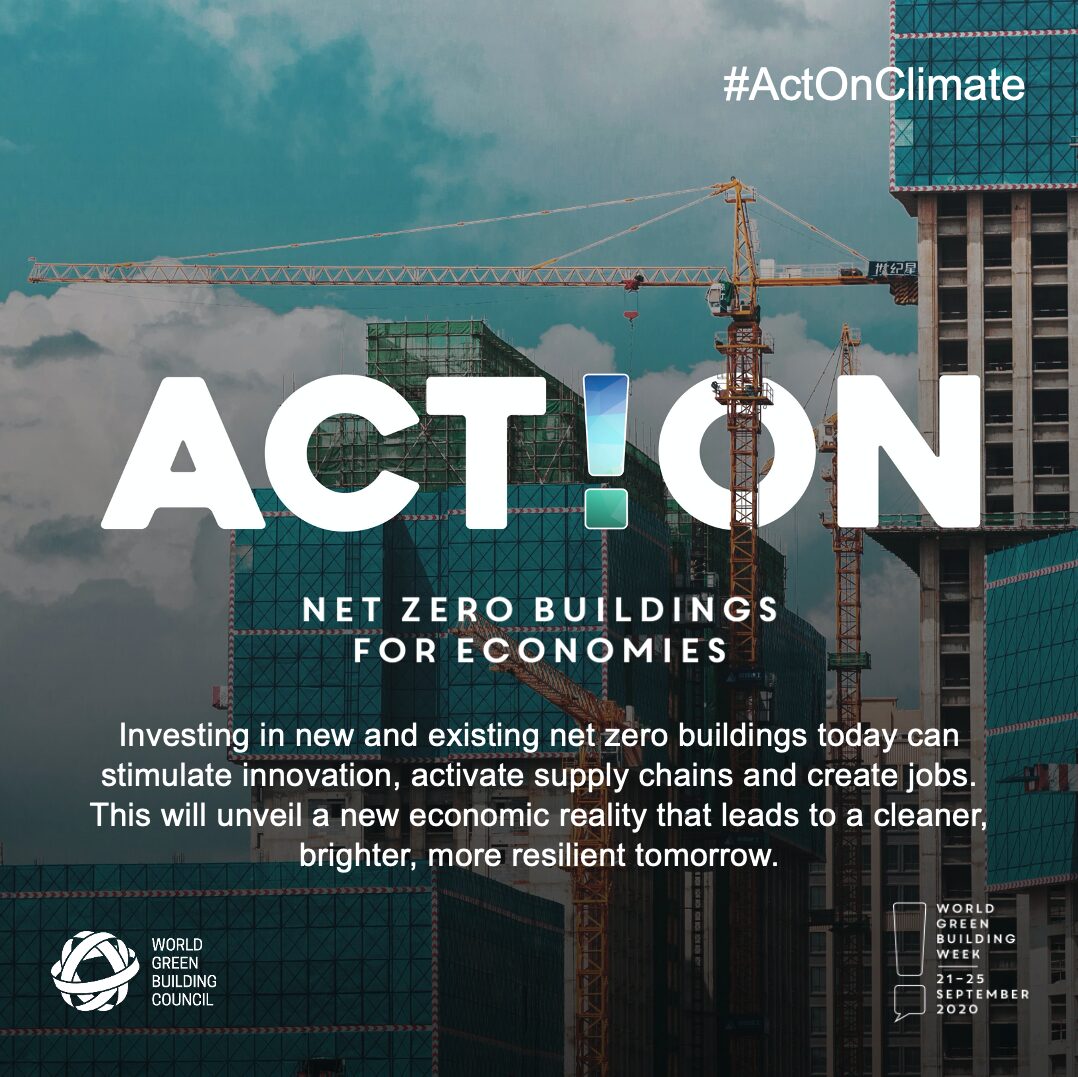
As a part of World Green Building Week 2020, WGBC prepared a Call for Action Statement urging all levels of governance to implement policies that would help achieving a fully decarbonized building and construction sector by 2050 and fulfilling other commitments included in Paris Agreement. This Call for Action Statement can be endorsed here.
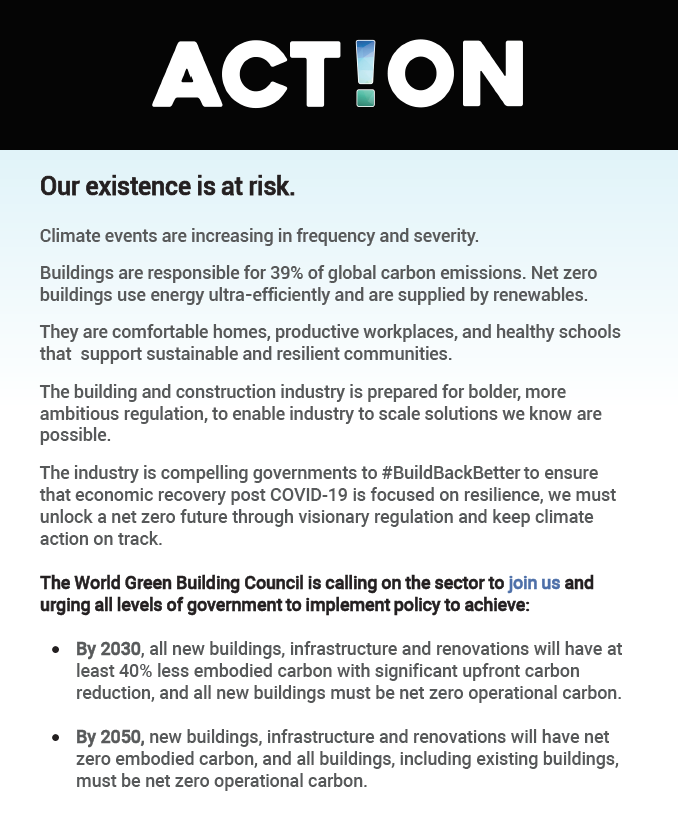
"Net zero carbon buildings: for communities, for the planet, for economies. No matter where you are, you can #ActOnClimate #WGBW2020."
Find more information about WGBC here.
Find more information about World Green Building Week here.
This week, from September 23rd to September 29th, World Green Building Council (WorldGBC) organizes an annual campaign promoting greener environment in building sector. During this World Green Building Week, they attempt to raise awareness in issue of carbon emissions from all stages of buildings' lifecycle. Carbon emissions from building sector hugely contribute to environmental pollution and WorldGBC tries to encourage building companies, responsible stakeholders and other influential organizations to take green action and reduce carbon emissions from buildings. At the same time, you can take part in this campaign even as an individual if you take some action to build a greener future of buildings and show it on social media using #BuildingLife or #WGBW2019 hashtags!






Most importantly, as part of the 10th anniversary of World Green Building Week, WorldGBC introduces a new report "Bringing embodied carbon upfront". Following on this week's theme, WorldGBC manages to tackle all the relevant stakeholders important during the whole life cycle of a building, such as non-governmental organizations, researchers, policy makers, investors, developers, designers and material manufacturers. The vision and ambitious conclusions coming out from the report has been endorsed by many influential organizations who further encourage to adopt the recommendations for decarbonized future of building and construction industry.
For the conclusion, a short story about carbon emissions and how it all works.
Find more information about WorldGBC here.
Find more information about World Green Building Week here.
Check out the new report here.
When buildings are net zero they use clean energy, are highly efficient and don’t waste energy - helping us to win the fight against climate change. That makes them heroes. Let’s make all buildings net zero by 2050.
#OurHeroIsZero
World Green Building Week, 25 September to 1 October 2017, is an annual event that empowers the green building community to deliver green buildings for everyone, everywhere. Buildings can be heroes in the fight against climate change - and so can you.
Buildings are often seen as the villains when it comes to climate change, but they can actually be the heroes; heroes who like us, care about our future. They’re called net zero buildings, and every step we take to make our buildings get close to net zero is important.
This World Green Building Week WorldGBC is encouraging people everywhere to see the faces of the heroes in the buildings where they live and work and to join them in the mission to make all buildings net zero. In this fight, our hero is zero.
Join the movement - by downloading our resources, adding your actions to our Hero Action Map, or by signing up to Thunderclap social media campaign at the World Green Building Council website.
World Green Building Week is the flagship event of the global green building movement organised by WorldGBC and led by its network of over 70 Green Building Councils and their 32,000 member companies.